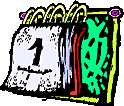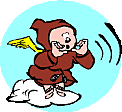With The Commentary of the RABAM

names of everyone who doesn’t finish the full shiur of marror.
Shiur of marror = the measure of bitterness; the bitter herbs at the
seder table.
Writing down the names = the first part of a guilt-trip that will last
forty years. No one may escape the laying on of guilt. Haven’t you
learned ANYTHING?!?
Pesach Drasha
Rabboisai—Before I begin this week’s drasha, I must share with you a new experience I had this year. This year, instead of selling my chometz to a shaygitz down the block, I used a new approach, taking Hilchois Pesach into a new millenia. I sold my chometz on the Internet—on E-Bay.
Selling chometz to a shaygetz = to fulfill the obligation to have no leavened substance (chometz) in one’s possession during the eight days of Passover, it is customary to sell all remaining chometz to a Gentile.
Shaygetz = the type of Gentile even gentiles don’t want their daughters to marry.
Down the block = because Judaism is a religion that stresses active involvement with one’s fellow man.
Hilchois Peasach = the laws (hilchos) of Passover. Chometz = leavened
substances or substances that can be leavened with yeast: breads, cereals, grain alcohol, cookies, crackers, some vinegars, erva, etcetera.
Ich vais, you should have seen—every goy in America was putting in a bid. 50 cents. 60 cents. I tell you, Klal Yisroel can make a killing this time of year. Next year, in addition to selling my chometz, I am also going to try to get rid of those old chairs that have been sitting in the attic for years.
Ich vais = because he knows. Klal Yisroel ™ = The Jewish people; a chometz-selling collective.)
Why is this night different from all other nights? Ma nishtana?
Farvoos iz de nacht foon Pesach ( ) foon alla nacht foon a gantz yur
Ma nishtana = Short for ‘Ma nishtana ha-laila ha-zeh mi-kol ha-leilot?
Farvoos is der nacht fun Peysach andisht fun alle nachten fun a yor?).
This is the question that introduces the four questions which must be asked and answered on this night.
These are the four question (di fir kashes):
Why is it that on all other nights we eat bread or matza, but on this
night we eat matza?
She be-chol ha leilot anu ochlin chametz u-matza, ha leila hazeh kulo
matza?
Farvoos alle nachten fun a gantse yor, as mir villen, essen mir
chometz, und as mir villen, essen mir matzo, ober der nacht fun Peisach essen mir nur matzo, ober kein chometz tueren mir nisht essen.
Why is it that on all other nights we eat all kinds of vegetables, but on this night we eat bitter herbs?
She be-chol ha leilot anu ochlin she’ar yetajit, ha leila hazeh maror?
Farvoos alle nachten fun a gantse yor as mir villen, essen mir alle sorten grinsen, ober der nacht fun Peisach essen mir nur bissere
grinsen.
Why is it on all other nights we do not dip even once, but on this night we dip twice?
She be-chol ha leilot en anu matbilin afilu pa’am echat, ha leila hazeh
shetey fe’amim?
Farvoos alle nachten fun a gantse yor tunken mir ein mol eichnit eyn? Ober der nacht fun Peisach tunken mir eyn tswei mol? Why is it that on all other nights we eat either sitting or relining, but on this night we eat in a reclining position?
She be-chol ha leilot anu ochlin bayn yoshvin u-vayn mesubin, ha Leila hazeh kelanu mesubin?
Farvoos alle nachten fun a gantse yor, as mir willen, essen mir sitsendik, und as mir willen, essen mir ungeshpert? Ober der nacht fun Peisach essen mir allen ungeshpert?
Dayenu already!
Why don’t we ask this question on other holidays? Yom Kippur for example: Why am I starving half to death while missing game two of the World Series? Sukkus: Why does the Aimishteh insist I sit outside and have flies pick at my kneidlach? Shavuos: If I have to stay up all night, why must it be with overweight, bearded men? And Chanukah: Why am I celebrating the rise of the despotic regime that stole Malchus Bais Dovid, the monarchy historically assigned to the Davidic lineage, when I should be out drinking eggnog and making out with hot shiksas under the mistletoe?
Yom Kippur = The day of atonement (when we fast, shlug kapoyres, and wipe our spectacles if we used a live chicken for the shlugging. The hotarnegol is damned.
Sukkus, sukkot = the feast of booths, when we build a ramshackle shed on our fire-escape and call our landlord an anti-Semite for complaining.
Shavuos = Literally weeks, as per the possook in Vayikra “you shall count seven whole weeks” (23:15), also callled the feast of first fruits(yom habikkurim) and the holiday of the reaping (Chag HaKatsir). On this day, exactly fifty days after passover, it is customary to spend all night in the Beis Medrish studying and eating cheesecake, in commemoration of receiving the law (matan torah - Gentlemen, we have adeal!).
Chanukah = the overthrough of Syrian rule, the feast of lights, and the gorging on Latkes. The dreidel symbolizes something, who knows what. You are commanded to play with it, d’rabbanan. Hot Shiksas = Both a blessing and a curse. Not a festival, except in the land.
We don’t ask these questions on those other nights because there is something sacrilegious about the whole idea.
You: Oh Aimishteh, why should I do your Mitzvois?
Aimishteh: Shut up you minuval before I make your wife be mezaneh with the Mikvah lady (chass v’sholom).
You: But Rebboinoisheloilum, I am really curious.
Rebboinoisheloilum: What do I look like, Google?
No. We don’t ask this question the rest of the year. But on Pesach, paradoxically, we do ask such a burning shayla. And we do this because the answer is more shocking than the question.
Mezaneh with the Mikvah lady = water, nudity, cold Russian winters - need I say more?
Mikvah = A pool of living water in which women and cooking vessels are immersed to purify them. But what do women and cooking vessels have in common? This seems utterly English!
Google = one of a pair of mentioned in scripture: Google, and Magoogle, a fierce king and his realm. See Ezekiel, chapters 38 and 39.
Shayla = a question, a problem, a what is it. Frogn a kashe.
On Pesach we celebrate assimilation. Once upon a time our ancestors sat in bondage in Egypt. By day, they labored over brick and mortar—dressed in the flimsiest of work clothing, while cowering under the harsh supervision of a sadistic taskmaster named Ahmed. By night, they labored over other, more colorful tasks—dressed in black leather, a spiked collar and a muzzle, while cowering under the harsh supervision of a sadistic dominatrix named Fatima.
In this state of subordination, both our bodies and our souls were denied independence. We spent years dominated under the harassment of a cruel and unsympathetic power, which cared not for our daily struggles or basic needs. This resulted in a psychological state of inferiority, as well as recurring insomnia and frequent impotence. (Indeed, this whole thing sounds uncomfortably similar to the average marriage.)
Indeed, it took a great leader to end this harsh cycle and lead our people to freedom, a leader who was insulated from the travails that had
beaten down all of his brethren from Klal Yisroel, a leader who was, in fact, very much assimilated. Moishe Rabbeinu grew up not as a slave, but as an Egyptian prince. No doubt he grew up the typical Egyptian prince: MTV, smoking in thepyramids, Yetzer Harrah. But had he not lived like a Mitzri, theAimishteh would not have chosen him to lead the Bnei Yisrael. Look at his brother, Aron Hacohain. He was raised amongst Klal Yisroel, suffering their same fate, yet ultimately his job was to hold Moishe’s stick, speak for him on occasion and take his messages. In essence, he was a schlepper.
Moishe Rabeinu = Moses our teacher.
Yetzer HaRa = The evil inclination, which causes us to do wrong. Some
say a dybbuk that hides in the mikvah.
Mitzri = an Egyptian, a native of Mitzrayim.
Aimishteh = the great what is HE and where is HE when you need Him, HaKadoshBoruchHu, HaShem, Ribbon Olam, Melech ha Mlachim.
Bnei Yisrael = Plural of Ben Yisrael, which is a son or (descendant) of Jacob, the plural referring to all those who came out of Egypt and formed the Hebrew nation.
Aron HaCohain = A’aron The Priest, the minuval who was given the priesthood after designing the golden calf (eigel ha zahav). He gets rewarded and we get punished?!?!?!
Klal Yisrael = the collective of the descendant of Israel (Jacob, after
he struggled with G-d in the night).
Schlepper = My other brother in law, not the shaygetz.
So we celebrate assimilation on Pesach, even more than on Purim, which commemorates a time when Esther HaMalka curried the favor of the king by
giving up her Bisulta.
Purim = the feast of lots, when we pretend we’re drinking more than we are accustomed to, so that our bashertes don’t realize how much we normally drink. You try intimacy with a woman in a sheital!
Esther HaMalka = Melech Achasveroosh’s pupke, the niece of Mardochai, the rival of Vashti the yenta.
Bisulta = Virginity, maidenhood, commodity.
And because we celebrate assimilation, we must also realize that the opportunity that confronted Moishe Rabbeinu can happen to any of us, in any generation. You can be sitting in your office, minding your own business, eating traifus and reading Golf Digest, but you never know, you might be called upon to save Klal Yisrael. Or even worse, you might be asked to donate money to a Yeshiva that has more rabbehim than talmidim.
Eating traifus and reading Golf Digest: why are they mentioned in relation to each other? Because as Traifus is to the body, being a sacrilege of the stomach, though eminently edible and nutritious, so golf is a sacrilege of the Sabbath, though being demonstrably beneficial to the nerves and the heart.
Yeshiva = a place where rabbehim teach talmedim. Rabbehim = those who teach the talmedim in the yeshiva. Talmedim = those who, in the yeshiva, are taught by the rabbehim. Shoyn, nu?
Yet, it is with trepidation and discomfort that we embrace assimilation. Sure, you would LOVE to be learning in the Bais Medrish and wearing Tfillin all day, but who would get your salary, draw on your expense account, and get your frequent flyer miles?
Bais medrish = a house of study, a shul (from escola, through mediaeval German schul), a synangogue (from Greek sunagoge, derived from sunagein, meaning bringing together).
Tefillin = phylacteries, being small leather boxes containing certain verses from scripture, which one straps to one’s forehead and to an arm, as reminders of the deal we have with the almighty and the sanctity with which we should go about our davening (prayer) and our leyning(chanting of Toireh). It’s a mitzvah to use Tefillin.
Frequent flier miles = benefits that in our day and age accrue in hours, but which took Moishe and klal Yisrael forty years of wandering. A miracle.
So to echo and enforce the discomfort of our ambivalence, we eat matzo every day for eight days. We start off enthusiastically, consuming our share of Matzo under the rigorous guidelines set forth by Chazzal, in their deepest learned malevolence. We reenact the struggles of our ancestors, in an effort to internalize their travails.
Chazal = chachmeinu zichrono levracha, the sages of the past. Chachmein, from chacham, chochem = Amsterdam slang for smart, clever.
Chochemerd = a wise-ass.
Yet as the days progress, our yearning for freedom grows. It builds up inside us, more and more each day. This sought after passage into freedom is not like a quick everyday event, but grows. With every bite of matzo, we feel the pressure and yearn to explode, free at last. And finally, when that release and freedom does come, perhaps with a little help of fruit compote, we celebrate freedom itself and wipe the sweat off our brow.
Fruit compote = in reference to both charoses AND to tzimmis. Fruit is associated with guilt, based on a verse in bereishis, and mothers worldwide. It’s good for you. Eat it! It’ll make you regular. What!?!
Ah Gutten Yuntif, you minuval.




